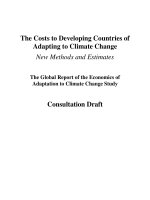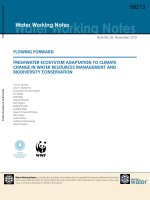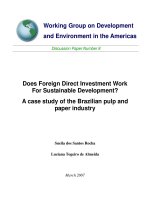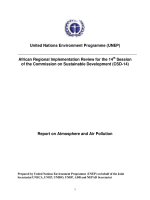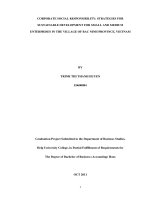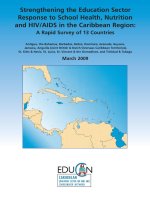Efficiency management solutions of life skills education activities response to climate change and prevention of calamity disaster for sustainable development for ethnic minority students
Bạn đang xem bản rút gọn của tài liệu. Xem và tải ngay bản đầy đủ của tài liệu tại đây (1.81 MB, 8 trang )
KHOA HỌC, GIÁO DỤC VÀ CÔNG NGHỆ
EFFICIENCY MANAGEMENT SOLUTIONS OF LIFE SKILLS
EDUCATION ACTIVITIES RESPONSE TO CLIMATE CHANGE
AND PREVENTION OF CALAMITY DISASTER FOR SUSTAINABLE
DEVELOPMENT FOR ETHNIC MINORITY STUDENTS IN ETHNIC
MINORITY BOARDING UPPER SECONDARY SCHOOLS IN THE
NORTHWEST REGION IN THE CURRENT PERIOD
Vu Thi Thu Trang
Vietnam Academy for Ethnic
Minorities
Email:
Received: 25/10/2019
Reviewed: 30/10/2019
Revised: 7/11/2019
Accepted: 12/11/2019
Released: 20/11/2019
DOI:
E
ducation management of life skills to cope with climate change
and calamity disaster prevention for the sustainable development
of ethnic minority students at ethnic minorities boarding high schools
in the Northwestern region is conducted mainly through integrating
the content of life skills education in response to climate change and
preventing natural disasters for ethnic minority students into teaching
basic subjects, through extra-curricular educational activities, through
Extracurricular activities, labor and collective activities. Education
on life skills to respond to climate change and disaster prevention for
the sustainable development of ethnic minority students in recent years
has just stopped at the implementation of the documents of Ministry
of Education and Training (MOET), Departments of Education and
Training (DOET). Some ethnic minority boarding high schools have not
been proactive in developing a plan to implement the task of educating
life skills to cope with climate change and prevent natural disasters
for the sustainable development of ethnic minorities students, not well
directed education forces in schools and diverse forms of life skills
education to respond to climate change and disaster prevention for the
sustainable development of ethnic minorities students. Through the indepth analysis of research results in the period of 2013-2019, the author
of this paper has presented a system of effective management solutions
for education of life skills to cope with climate change and avoid natural
disasters for the sustainable development of ethnic minority students in
ethnic minorities boarding high schools in the Northwest region in the
current period.
Keywords: Effective management solutions; Educating life skills
to cope with climate change and prevent natural disasters; Sustainable
Development; Ethnic minorities students; Ethnic minorities boarding
high schools; Northwestern region.
1. Introduction
The four pillars of 21st century education, which
are essentially an approach to life skills in education,
have been thoroughly grasped in renewing the
objectives, content and methods of general education
in Vietnam.
Since 2001, the Ministry of Education and
Training has provided life skills education for high
school students with the support of international
organizations, especially UNICEF in Viet Nam. Life
skills education for students is done by exploiting the
content of a number of subjects with many advantages
such as civic education, technology, etc., including
life skills education to respond to variables. climate
Volume 8, Issue 4
change and disaster prevention for the sustainable
development of local communities.
The manifestations, characteristics, causes
and impacts of life skills education in response
to climate change and disaster prevention for the
sustainable development of local communities have
been carefully researched and investigated. Strategic
solutions globally and in each country in the world
to effectively respond to climate change have been
proposed and implemented aggressively. Responding
to climate change to reduce the consequences of
climate change is one of the leading goals and tasks
of each country, including the great role of education.
The Ministry of Education and Training also
57
KHOA HỌC, GIÁO DỤC VÀ CÔNG NGHỆ
strengthens cooperation with ministries, branches,
international organizations and non-governmental
organizations operating in the field of natural disaster
risk in Vietnam in order to step by step take steps
to respond, adapting to climate change in the field
of education moves to a new stage of development,
ensuring the goal of sustainable development. These
activities aim to raise awareness, equip knowledge
and skills on climate change response to education
managers, teachers and students, gradually building
a safe school system.
However, up to now, the implementation of
life skills education activities to cope with climate
change and disaster prevention for the sustainable
development in the Northwestern ethnic minorities
boarding high schools has not been implemented or
has been implemented but not highly effective, some
contents of environmental education, climate change,
sustainable development, etc. have been implemented
inconsistently, systematically, updated and inherited
among classes and levels learn; examples, misleading
implementation, analysis, confusion among learners
or issues beyond the awareness of ethnic minority
students. Teaching time for subjects integrated with
these knowledge units is not so much, when teaching,
teachers only try to ensure enough programs, enough
time but do not focus on analysis, expansion or
contact to consolidate, inculcate, apply in real life
... Educating and educating about life skills to cope
with climate change and preventing natural disasters
because sustainable development is not merely
teaching learn about climate change and disaster
prevention through developing diverse activities in
learners’ awareness and capacity to cope with climate
change, disaster prevention and at the same time help
learners have protected behavior behaviors based on
the basic directions of education for development
sustainability, to help ethnic minority students and
the community convinced about the good prospects
of climate protection and successful adaptation to
climate change in the future.
Education management of life skills to cope
with climate change and disaster prevention for the
sustainable development of ethnic minority students
in the Northwestern ethnic minorities boarding high
schools is conducted mainly through integration.
content of life skills education to respond to climate
change and disaster prevention for ethnic minority
students to teach basic subjects, through afterschool education activities, through extra-curricular
activities courses, labor and collective activities.
However, the activities of educating life skills to cope
with climate change and preventing natural disasters
for the sustainable development of ethnic minority
students in recent years have only stopped at the
implementation of documents copy of the Ministry
of Education and Training and the Department
of Education and Training, some ethnic minority
58
boarding high schools have not been proactive in
developing a plan to implement the task of educating
life skills to cope with climate change and prevent
natural disasters for the sustainable development
of ethnic minorities students, not well directed
education forces in schools and diverse forms of life
skills education to respond to climate change and
disaster prevention for the sustainable development
of ethnic minorities students.
The management of life skills education in
response to climate change and disaster prevention
for the sustainable development of ethnic minority
students and the management of life skills education
activities of the boarding high schools for ethnic
minorities in the Northwest region not really effective
due to many subjective and objective reasons.
Therefore, it is necessary to conduct research and
development of solutions to manage life skills
education in response to climate change and disaster
prevention because sustainable development is an
urgent issue. Ethnic minority students must learn
about the causes of climate change, its manifestations,
impacts of climate change, how to respond to climate
change and the formation of life skills to cope with
climate change and prevention. natural disasters
for the sustainable development of ethnic minority
students, helping ethnic minorities students have the
ability to form attitudes and behaviors to respond and
adapt to climate change in the Northwest region.
Stemming from the above-mentioned reasons,
the author chooses the research issue: “Effective
management solutions of life skills education
activities to cope with climate change and disaster
prevention for sustainable development for ethnic
minority students at the ethnic minorities boarding
high schools in the Northwest region in the current
period”. This research meets important and urgent
theoretical and practical requirements.
2. Research method
2.1. Group of theoretical research methods
2.2. Group of practical research methods
2.3. Data processing methods
3. Overview of the problem research
3.1. In another country
In 1890: The US Department of Labor established
a Secretariat to train the necessary skills, the members
of this committee include many different fields such
as education, businessmen, officials, civil servants. It
aims to boost the economy with highly skilled labor
and high-paying jobs.
In the early 1990s, some Asian countries such as
Laos, India, Cambodia, and Thailand...researched
and implemented life skills teaching programs from
pre-school to high school in the direction of teach
integrated into literacy and academic programs;
Mainstreaming subjects and programs at different
JOURNAL OF ETHNIC MINORITIES RESEARCH
KHOA HỌC, GIÁO DỤC VÀ CÔNG NGHỆ
levels to equip students with the necessary life
skills to help students enjoy life-related skills and
divide life skills into three main groups: Basic
skills including reading, writing, and writing skills;
General skills include critical thinking skills, creative
thinking skills, decision-making skills, problemsolving skills; Specific skills groups include health
protection skills, gender equality...
In 1996: UNICEF adopted the program “Life
skills education to protect health and fight HIV/
AIDS for young people in and out of school”.
In 2003: UNICEF funded education aimed at
educating students about life skills and since then
education has started to focus on life skills education
for ethnic minorities students.
In 2009, together with the Japanese cooperation
agency JICA, AFD initiated a Support Program to
Respond to Climate Change. This is a multi-year
budget support program based on the Government’s
reforms and progress on public policies that contribute
to climate change. In Korea, elementary school
students learn how to cope with climate change,
earthquakes, natural disasters, etc. at the Seoul
Emergency Management Center (Hoc & Ngu, 2009).
In Japan, the government attaches great
importance to propaganda about disaster, on the
streets, people can easily see panels, posters to guide
people when the disaster happens.
In some ASEAN countries, in the programs of
secondary schools, high school content systematically
educates environment, especially content related
to deforestation and environmental destruction. be
considered the direct cause of disasters. In addition,
students also learn the contents related to protecting
the living environment through integration into
traditional subjects on nature and society... In
Sri Lanka, most Buddhist temples and churches.
Muslims along the coast of the country have large
radio speakers to transmit radio or television warning
information about natural disasters. The government
also required state radio stations to comply with the
timely warning of tsunamis, volcanoes, etc. (Ministry
of Education and Training, 2012a)
On December 12, 2015, 195 countries attending
the United Nations Framework Convention on
Climate Change (COP 21) in France approved
an agreement to curb global warming, which is
considered strong and show the most extensive
international cooperation ever.
3.2. In Vietnam
The term life skills in Viet Nam, starting to be
known from the UNICEF program (2006) “Life
skills education to protect the health and prevention
of HIV/AIDS for young people inside and outside
the school” through During the implementation of
this program, the content of life skills concepts and
life skills education has been increasingly expanded
Volume 8, Issue 4
(Binh, 2011)
In 2001: Ministry of Education and Training
implemented life skills education for high school
students through the project “Education for healthy
living, life skills for children and adolescents”
sponsored by UNICEF.
In 2007, the author Nguyen Thanh Binh had
systematic studies on life skills and life skills
education (Binh, 2011).
In 2011: Ministry of Education and Training
opened a training course to enhance life skills
education in some subjects and educational
activities in high schools for more than 700 teachers
representing teachers in 23 southern provinces; a
number of project programs such as the experimental
program “Education on healthy living and life skills”
supported by UNICEF have been piloted in 20
schools in 5 districts of the provinces of Lang Son
and An. Giang, Hanoi and Ho Chi Minh City.
There have been many studies on the situation and
measures to improve the effectiveness of life skills
education in general for students in order to improve
the quality of comprehensive education such as:
- Author Nguyen Thi Thanh Nhan Hanoi
University of Education (2014): Master’s thesis
in Educational Management “Managing life value
education - Life skills for students at Nguyen Sieu
High School, Hanoi”.
- Author Dinh Thi Thien Hanoi University of
Education (2015): Master’s thesis in Educational
Management “Managing life skills education for
students of secondary schools in Hoa Binh city”.
- Author Nguyen Thi Hanh Hanoi University of
Education (2015): Thesis of Master of Educational
Management “Managing life value education
activities - Life skills for students of Thanh Oai A
High School, Hanoi City”.
All three topics have studied the situation and
proposed measures to manage ethical education
activities in general and value education, life skills in
particular for high school students.
- Author Pham Thi Kim Hoa, VNU Hanoi
(2014): Master thesis “Research and propose
climate change education solutions in professional
secondary schools”. Researching the situation of
climate change awareness of teachers and students
and proposing climate change education solutions in
professional secondary schools.
- Author Le Thi Thu Huong Hanoi Pedagogical
University (2014): Master’s thesis in Educational
Science “Education to cope with climate change
through extracurricular activities in elementary
schools from an integrated perspective”. The thesis
studies the current situation and proposes educational
measures to cope with climate change through
extracurricular activities in elementary schools from
59
KHOA HỌC, GIÁO DỤC VÀ CÔNG NGHỆ
an integrated perspective.
- Author Nguyen Thi Hoa, Vinh University (2015):
Master thesis of education science “Integrating climate
change response education in teaching Geography
subjects for grade 4 students”. Research projects on
the current situation and propose measures to integrate
education in response to climate change in teaching
Geography subjects grade 4.
- Author Tran Bich Van Hanoi National
University (2015): Master thesis of climate change
“Building a communication model on coping with
climate change in secondary schools in Hanoi”.
Researching the current situation of communication
issues on climate change in secondary schools and
proposing measures to build models of climate
change communication in secondary schools.
Central Highlands National Research Project
3 (2013-2015) of Ngo Quang Son’s project leader:
“Researching the resilience to natural disasters and
proposing a comprehensive solution to improve the
preventive capacity of original local ethnic minorities
in the Central Highlands” have studied the ability to
cope with the main types of natural disasters and
proposed total solutions to improve the disaster
prevention capacity of ethnic minorities in the Central
Highlands, the Central Highlands accommodation
in the context of coping with climate change today.
The main research contents have been solved:
Researching theoretical basis related to climate
change, response to climate change, natural disasters
and disaster risks; lessons learned domestically and
internationally on improving disaster prevention
capacity; Identify types of natural disasters, natural
disasters and their impacts on people, economy,
society and environment in ethnic minority areas in
the Central Highlands over the years; Analyze the
possibilities and factors affecting the natural disaster
community’s ability to respond to and prevent
natural disasters in the Central Highlands; Proposing
perspectives, orientations and overall solutions to
improve natural disaster prevention capacity of ethnic
minority communities in the Central Highlands.
Proposing a number of pilot models of disaster
preparedness and response for a number of local
ethnic minorities in the Central Highlands. Organize
the implementation of the Information, Education
and Communication (IEC) model based on the
active participation of the community to forecast,
warn, prevent, respond to and mitigate harms of
natural disasters and disaster recovery for the Gie Trieng ethnic communities in Kon Tum and Co Ho
in Lam Dong. This state-level project also initially
organizes life skills education activities, after-school
educational activities, extracurricular educational
activities, democratic flower picking, etc. provincial
boarding schools, district boarding schools, general
education schools, provincial continuing education
centers, district continuing education centers;
60
community learning center in the Central Highlands
provinces to spread to the local ethnic minorities, to
meet the needs of capacity building 6+ of the ethnic
minorities community in the Central Highlands in
public impacts on forecasting, warning, preventing,
responding to, reducing harms of natural disasters
and recovering from natural disasters.
Life skills education activities in schools now
have many research topics but the topic of life
skills education management to respond to climate
change and disaster prevention for the sustainable
development of ethnic students ethnic minorities in
Northwestern high schools have not been studied.
Therefore, the selection and study of issues:
“Effective management solutions for life skills
education in response to climate change and disaster
prevention for the sustainable development of ethnic
minority students in Northwestern high schools in
the current period ” will play an important role in
studying theoretical and practical basis of climate
change, responding to climate change and preventing
natural disasters for sustainable development. firmly
and urgently in the Northwest region in the current
period.
4. Overall assessment of the management of
life skills education activities to cope with climate
change and disaster prevention for the sustainable
development of ethnic minority students in ethnic
minority boarding upper secondary schools in the
Northwest in the current period
4.1. Strengths
- Ethnic Minorities boarding high secondary
schools have developed an education plan to train
life skills to cope with climate change for ethnic
minorities students to integrate in the plan of
implementing tasks for each school year;
- Conducted professional guidance to instruct
teachers to prepare related articles, integrate and
integrate the content of life skills education in
response to climate change and disaster prevention
for the sustainable development of ethnic minority
students. subjects in regular class time;
- Youth Union develops a plan to organize
extracurricular activities including education on
life skills to cope with climate change and natural
disaster prevention for the sustainable development
of ethnic minority students. Regularly organize
extra-curricular activities with class sizes, grade
levels and the entire school scale. The scope and
form of organization is richer.
- Organization for students to participate in
outdoor activities...helps ethnic minorities students
relate reality, experience, thereby forming awareness,
attitudes and behaviors.
4.2. Weakness
The organization of activities is mainly the
JOURNAL OF ETHNIC MINORITIES RESEARCH
KHOA HỌC, GIÁO DỤC VÀ CÔNG NGHỆ
responsibility of the Youth Union’s Secretary, so the
planning, content selection and organization have
not been invested, carefully prepared, and promoted
participation and coordination of school members.
- The school administrators put the content of the
life skills education program to cope with climate
change and prevent natural disasters because the
sustainable development of ethnic minority students
is not appropriate and not creative; The program is
still sketchy.
- The coordination of mass organizations and
forces inside and outside the school has not been
effective; It has not promoted the strength of life
skills education forces to cope with climate change
and natural disaster prevention for sustainable
development. From the limitations and shortcomings
mentioned above, it leads to the education of life
skills to cope with climate change and natural disaster
prevention for the sustainable development of ethnic
minority students in the Northwestern boarding high
schools for ethnic minorities.
5. System of solutions for effective management
of activities of educating life skills to cope with
climate change and preventing natural disasters
for ethnic minority students at the boarding high
schools for ethnic minorities in the Northwest
region in the current period
5.1 Solution 1: Enhancing awareness raising
activities for education managers, teachers and
staff in the school about the importance of life skills
education activities to cope with climate change and
disaster prevention for the sustainable development
of ethnic minority students.
Life skills education in response to climate change
and disaster prevention for sustainable development
is one of the ways to realize the comprehensive
educational goals. In order to meet the goals of
education innovation, educating life skills to cope
with climate change and preventing natural disasters
for sustainable development, there must be programs
and contents suitable to the requirements of
renovation and become mandatory activities for with
schools in general and general secondary education
schools in particular in order to achieve the following
specific objectives:
Helping students to be aware of the life skills
education activities to cope with climate change and
disaster prevention because sustainable development
is a practical activity to meet the needs of ethnic
minority students themselves and the needs of the
commune. Since then, ethnic minority students have
been training their skills and equipping themselves
through awareness, behaviors, actions and jobs
to deal with the consequences caused by climate
change and natural disasters, thereby developing
strategies. action plan to minimize the impact of
climate change, natural disasters on the environment,
Volume 8, Issue 4
with current and future life.
Helping the life skills education teams to cope
with climate change and prevent natural disasters
for sustainable development, understand why it is
necessary to carry out life skills education to respond
to climate change and prevent natural disasters for
sustainable development for students. ethnic minority
students and train them on the skills to recognize
what is climate change, the causes of climate change,
the consequences of climate change and thereby
formulate their own life skills to adapt and minimize
harms. Climate change caused in the present and the
future. High schools for ethnic minorities need to do
well in propaganda and organizing regular training
in order to raise the awareness of administrators,
teachers, staff, students, parents and local social
organizations on the importance of educating life
skills to cope with climate change and natural
disaster prevention for the sustainable development
of ethnic minority students. This work will train
ethnic minority students to become young, active and
effective propagandists in climate change response
and disaster prevention for sustainable development
in schools, at home and the community where the
children live.
5.2. Solution 2: Develop a plan to educate
about life skills to cope with climate change and
prevent natural disasters for detailed sustainable
development in accordance with the psychological
and psychological characteristics of ethnic
minority students and practical conditions of
ethnic minorities boarding high schools in the
Northwestern region
The development of a plan to plan the direction
of the life skills education in responding to climate
change and natural disaster prevention for the
detailed sustainable development consistent with the
physiological and psychological characteristics of
ethnic minority students and the practical conditions
of the Northwestern boarding high schools for ethnic
minorities, and at the same time determine the results
to be achieved in the future of the activity.
Planning the management process of life
skills education in response to climate change
and natural disaster prevention for the sustainable
development of ethnic minority students will help
the Principal orient all activities in the school. and
discussing the strategic goals and specific goals to
be achieved, the expected mobilization of resources
to implement the goals and the expected situations
that will be encountered during the implementation
of the life skills education plan to respond to Climate
change and disaster prevention for the sustainable
development of ethnic minority students.
Establishing a Steering Committee for life skills
education to cope with climate change and disaster
prevention for sustainable development; assign
specific tasks to members of the steering committee;
61
KHOA HỌC, GIÁO DỤC VÀ CÔNG NGHỆ
check and assess activities of educating life skills
to cope with climate change and prevent natural
disasters for sustainable development.
Direct the development of a master plan on life
skills education in response to climate change and
disaster prevention for the sustainable development
of the school; Based on the overall plan, each part
and individual assigned the task of elaborating the
work plan they are assigned to take specific and
detailed responsibilities; The Steering Committee
approves the plan, monitors the implementation of
the plan of the life skills education forces to cope
with climate change and prevent natural disasters for
the sustainable development of the school.
5.3 Solution 3: Consolidating the personnel
structure, fostering and improving capacity of
educating life skills to cope with climate change
and preventing natural disasters for the sustainable
development of education forces in the ethnic
minorities boarding upper secondary schools
The school principal studied documents,
promulgated regulations of the school’s personnel
apparatus participating in the life skills education in
response to climate change and disaster prevention
for the sustainable development of ethnic minority
students; have regular training plan for educational
forces participating in life skills education to cope
with climate change and prevent natural disasters for
sustainable development in schools with appropriate
capacity and professional qualifications. In addition,
there is a method of organizing life skills education
to cope with climate change and natural disaster
prevention for the sustainable development of ethnic
minority students to achieve the highest efficiency.
The training and retraining of knowledge on
climate change response for managers, teachers, and
employees has been concerned by the Department
of Education and Training, issued a guiding
document for general high schools in general and
general secondary education schools for secondary
schools. implementation organization. However, the
training has only been in the form of implementing
documents, directing the implementation of tasks,
not going into depth, not organizing regularly and
continuously, the content has not been diversified
and has not been provided with training. forces
involved in educating life skills to cope with climate
change and disaster prevention for other sustainable
development in schools; The documents for the
forces participating in the life skills education to cope
with climate change and natural disaster prevention
for sustainable development are not yet abundant.
Therefore, in order to improve the quality of
life skills education in response to climate change
and natural disaster prevention for the sustainable
development of ethnic minority students, the
Principal needs to do well the regular training for staff
and teachers. staff and staff to improve the capacity
62
of educating life skills to cope with climate change
for the forces participating in educating life skills
to cope with climate change and preventing natural
disasters for sustainable development in schools in
the following forms: Page for the life skills education
forces to cope with climate change and natural
disaster prevention for the sustainable development
of content, methods, positive teaching techniques,
etc. for educational managers, teachers, staff qualified
to educate life skills to cope with climate change and
disaster prevention for the sustainable development
of students ethnic minorities.
5.4 Solution 4: Promote the direction of
diversifying forms of organization of life skills
education activities to cope with climate change
and prevent natural disasters for the sustainable
development of ethnic minority students
Creating an attraction and attracting students to
participate in life skills education activities to cope
with climate change and prevent natural disasters for
sustainable development, through which students can
cultivate and forge life skills, attitudes and behaviors,
know how to apply and respond to situations,
environmental conditions and the consequences
of climate change, natural disasters in life, thereby
forming personality, attitudes and behaviors for
students, helping They know how to protect the
environment, adapt and minimize the harmful effects
of climate change, natural disasters, and propagate
for everyone to do it together.
Researching guiding documents, reference
materials to select contents and ways of organizing
life skills education to respond to climate change
and prevent natural disasters for the sustainable
development of ethnic minority students in
accordance with psychological characteristics,
their age, to meet the requirements of innovation in
education.
Directing the life skills education teams to cope
with climate change and prevent natural disasters for
the sustainable development to diversify forms and
methods of organization to suit the required content,
create opportunities for experience and practice ,
manipulating and creating excitement for students,
specifically: Organizing collective activities on the
occasion of celebrating the major holidays in the
school year, propaganda for students to have an
understanding of the environment, climate change, its
causes, consequences, adaptive skills and mitigation
Consequences of climate change ...
5.5 Solution 5: Strengthening the inspection
and evaluation of life skills education activities to
cope with climate change and disaster prevention
for the sustainable development of ethnic minority
students on a regular basis
Testing and evaluating is an effective solution to
help the school to get feedback from the management
JOURNAL OF ETHNIC MINORITIES RESEARCH
KHOA HỌC, GIÁO DỤC VÀ CÔNG NGHỆ
subjects, to grasp the work progress, compare the
actual performance with the set goals, thereby
taking measures. appropriate management of life
skills education in response to climate change and
disaster prevention for sustainable development.
Through evaluation and evaluation to reward typical
collectives and individuals, replicate typical; reward
promptly to motivate and encourage the movement.
For collectives and individuals who have not
done well, they have to remind, criticize and draw
experiences to implement the life skills education
activities to cope with climate change and prevent
natural disasters for sustainable development for
ethnic minority students are more effective.
Principals need to develop criteria to evaluate the
life skills education in response to climate change
and disaster prevention for sustainable development.
Principals need to develop a plan for testing,
evaluating, launching, putting criteria of education
on climate change response and disaster prevention
for the sustainable development of ethnic minority
students in the content of the emulation campaigns
in school year.
Summarizing and rewarding administrators,
teachers, and teachers for achievements; remind,
criticize or use higher penalties when administrators,
teachers, teachers do not perform well life skills
education in general and life skills education in
response to climate change and disaster prevention
for development. Sustainability in particular for
ethnic minority students.
5.6 Solution 6: Establish physical conditions and
enhance the application of information technology
to ensure life skills education in responding to
climate change and preventing natural disasters
for sustainable development firmly in the ethnic
minorities boarding upper secondary schools
Create a spacious and clean pedagogical
environment; appropriate exploitation of playground,
training ground, functional rooms, with sufficient
equipment to serve the teaching and learning of life
skills in general and life skills education to respond to
climate change and prevent natural disasters because
of sustainable development in particular.
Strengthen the application of information
technology to update news and current news on
the situation of climate change in the country
and internationally, to get materials from Internet
websites for educating life skills to cope with climate
change in schools.
Invest in funding for procurement of facilities in
general and teaching equipment in particular, improve
the school landscape; procurement of equipment and
facilities for teaching activities, collective activities
and organizing life skills education in response to
climate change and natural disaster prevention for the
sustainable development of ethnic minority students.
Volume 8, Issue 4
To well carry out the work of socializing
education, making use of the material and spiritual
support of individuals, organizations, enterprises
and benefactors in order to have facilities meeting
requirements. Organize life skills education to
respond to climate change and prevent natural
disasters for the sustainable development of ethnic
minority students.
Principals based on state budget allocations; The
school’s tuition revenue plans to invest, purchase
equipment for life skills education on climate change
response and disaster prevention for sustainable
development in particular.
6. Conclusion
Education of life skills to cope with climate change
and management of life skills education to cope with
climate change and natural disaster prevention for the
sustainable development of ethnic minority students at
the Northwestern Boarding High Schools for Ethnic
Minorities in order to form and develop awareness,
attitudes and behaviors for students, help them see the
causes and consequences of climate change, the types
of natural disasters from which they form their own
attitudes and behaviors in adapting and mitigating
harms caused by climate change, natural disasters,
as well as consciously propagating for everyone to
do together, towards a good life, a civilized society
and meeting Comprehensive educational goals in the
current period.
Life skills education in response to climate
change and natural disaster prevention for the
sustainable development of ethnic minority students
are concerned by schools, but not only the theory
but also the results of education. Life skills to cope
with climate change and prevent natural disasters
for sustainable development is to form awareness,
attitudes and behaviors of ethnic minorities students
in schools and in society, so there must be a
synchronized coordination between forces. In school
and family education, if so, the life skills of ethnic
minority students will be sustainable.
The test results of the managers and teachers’
evaluation showed that the solutions of managing
life skills education to cope with climate change
and natural disaster prevention for the sustainable
development of local communities for ethnic
minorities students. The proposed minorities are
highly necessary and feasible, consistent with the
reality of the Northwestern ethnic minorities boarding
high schools. The synchronous implementation of
the above management solutions will have the effect
of improving the quality of life skills education
management to respond to climate change and prevent
natural disasters for the sustainable development of
local communities for ethnic minorities students in
the Northwestern ethnic minorities boarding high
schools in the current period.
63
KHOA HỌC, GIÁO DỤC VÀ CÔNG NGHỆ
References
Binh, N. T. (2011). Topic textbook on life
skills education. Hanoi: University of Education
Publishing House.
Hoc, T. Q. (2011). Training document of trainers
on climate change (Ed). Science and Technology
Publishing House.
Hoc, T. Q., & Ngu, N. D. (2009). Some things
to know about climate change. Vietnam Association
for Nature and Environment Protection (VACNE),
Vietnam Union of Science and Technology
Association (VUSTA).
Ministry of Education and Training. (2012a).
ABC Handbook on climate change. Decision
No.1612/QD-BGDĐT dated April 27, 2012.
Ministry of Education and Training. (2012b).
Guidelines for teaching and learning about disaster
risk reduction and climate change response. Decision
No.1612/QDBGDĐT dated April 27, 2012.
Ministry of Education and Training. (2012c).
Training materials for teachers on climate change
and climate change response. Decision No.1612/
QD-BGDĐT April 27, 2012.
Ministry of Education and Training. (2013).
Handbook of climate change response education.
(Used in education).
Son, N. Q. (2016). Researching the resilience to
natural disasters and proposing a comprehensive
solution to improve the preventive capacity of original
local ethnic minorities in the Central Highlands.
GIẢI PHÁP QUẢN LÝ HIỆU QUẢ HOẠT ĐỘNG GIÁO DỤC KỸ NĂNG
SỐNG ỨNG PHÓ VỚI BIẾN ĐỔI KHÍ HẬU VÀ PHÒNG TRÁNH THẢM HỌA
THIÊN TAI VÌ SỰ PHÁT TRIỂN BỀN VỮNG CHO HỌC SINH DÂN TỘC
THIỂU SỐ Ở CÁC TRƯỜNG PHỔ THÔNG DÂN TỘC NỘI TRÚ TRUNG
HỌC PHỔ THÔNG KHU VỰC TÂY BẮC TRONG GIAI ĐOẠN HIỆN NAY
Vũ Thị Thu Trang
Học viện Dân tộc
Email:
Ngày nhận bài: 25/10/2019
Ngày phản biện: 30/10/2019
Ngày tác giả sửa: 7/11/2019
Ngày duyệt đăng: 12/11/2019
Ngày phát hành: 20/11/2019
DOI:
64
Tóm tắt
Quản lý giáo dục kỹ năng sống ứng phó với biến đổi khí hậu và phòng
tránh thiên tai vì sự phát triển bền vững cho học sinh dân tộc thiểu số ở
các trường phổ thông dân tộc nội trú trung học phổ thông khu vực Tây
Bắc được tiến hành chủ yếu qua việc lồng ghép nội dung giáo dục kỹ
năng sống ứng phó với biến đổi khí hậu và phòng tránh thiên tai cho học
sinh dân tộc thiểu số vào dạy học các môn cơ bản, thông qua hoạt động
giáo dục ngoài giờ lên lớp, thông qua hoạt động ngoại khóa, lao động và
sinh hoạt tập thể. Hoạt động giáo dục kỹ năng sống ứng phó với biến đổi
khí hậu và phòng tránh thiên tai vì sự phát triển bền vững cho học sinh
dân tộc thiểu số trong những năm qua mới chỉ dừng lại ở việc triển khai
theo các văn bản của Bộ Giáo dục và Đào tạo, của Sở Giáo dục và Đào
tạo. Một số trường phổ thông dân tộc nội trú trung học phổ thông chưa
chủ động xây dựng kế hoạch thực hiện nhiệm vụ giáo dục kỹ năng sống
ứng phó với biến đổi khí hậu và phòng tránh thiên tai vì sự phát triển bền
vững cho học sinh dân tộc thiểu số, chưa chỉ đạo tốt các lực lượng giáo
dục trong nhà trường và đa dạng các hình thức giáo dục kỹ năng sống
ứng phó với biến đổi khí hậu và phòng tránh thiên tai vì sự phát triển bền
vững cho học sinh dân tộc thiểu số. Qua quá trình phân tích sâu sắc các
kết quả nghiên cứu trong giai đoạn 2013-2019, tác giả bài báo này đã nêu
hệ thống giải pháp quản lý hiệu quả hoạt động giáo dục kỹ năng sống
ứng phó với biến đổi khí hậu và phòng tránh thiên tai vì sự phát triển bền
vững cho học sinh dân tộc thiểu số ở các trường phổ thông dân tộc nội trú
trung học phổ thông khu vực Tây Bắc trong giai đoạn hiện nay.
Từ khóa
Giải pháp quản lý hiệu quả; Giáo dục kỹ năng sống ứng phó với biến
đổi khí hậu và phòng tránh thiên tai; Phát triển bền vững; Học sinh dân
tộc thiểu số; Trường phổ thông dân tộc nội trú trung học phổ thông; Khu
vực Tây Bắc.
JOURNAL OF ETHNIC MINORITIES RESEARCH

